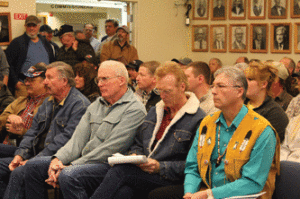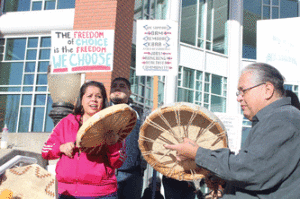The KBRA and the Klamath Hydroelectric
Settlement Agreement seek to establish
reliable water supplies and affordable power
rates for irrigators, restore fish habitat,
help the Klamath Tribes acquire the
92,000-acre Mazama Tree Farm and remove four
dams on the Klamath River.
In November, former Commissioners Al Switzer and Cheryl Hukill voted to support the KBRA and its amendments, extending the agreement to the end of 2014. Commissioner Dennis Linthicum, the sole member remaining on the board, voted against it.
New commissioners Tom Mallams and Jim Bellet voiced their opposition to the KBRA during their campaigns. They said previously they wanted to hear from the people on the subject again before the new board makes a formal decision on the issue.
Anti-KBRA
Anti-KBRA speakers called the commissioners out on their stance against the KBRA during the campaign.
“In my opinion you, the Klamath County commissioners, were elected in part because of your stance against the KBRA, and the previous commissioners were voted out in part because of their pro-KBRA views,” said Hank Cheyne, a project irrigator in Langell Valley. He said he is against the KBRA because of its requirement for dam removal and what he called “empty promises” by some signing parties.
KBRA opponents listed many of their grievances. Among them were the agreements that happened in a closed-door process that give no guarantees for water or power rates.
“When I do an Adobe word search on the document on my desktop the word ‘guarantee’ only appears one time, and that is in the negative where it states there is ‘no guarantee’ of affordable power for the irrigators,” said Brent Cheyne, another project irrigator. “Without such a guarantee, I will not support (it). We have to have an affordable power rate. I will be the first to admit that yes, we need an agreement. We do need to move forward on an agreement, but the KBRA is on life support and you need to pull the plug.”
“Having lived my whole life in the Klamath Basin, it is unbelievable to me how the KBRA has divided the community,” said Hank Cheyne. “There is a need for a settlement agreement that is acceptable to all involved parties in Klamath County, but it is not the KBRA.”
Pro-KBRA
Those supporting the KBRA urged the commissioners to stay “at the table” and continue to participate in the agreement.
“If you’re not at the table you will certainly be placed upon the menu,” said Steve Kandra, a Merrill-area farmer.
KBRA supporters emphasized the agreement was the only option and called it a way for people to come together. They said it does deliver water and affordable power, while helping meet tribal needs.
“Through the KBRA, we as irrigators have to stay engaged to protect ourselves,” said Gary Wright, president of the Klamath Water Users Association. “So I ask you, commissioners, to stay engaged. Whether you like it or not KBRA is and could be a way to keep the water flowing to the county and its economic values.”
stipler@heraldandnews.com; @TiplerHN


